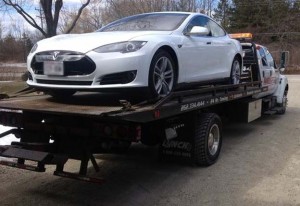Auto industry, in general, struggling to deal with high-tech problems.

The good news is that automakers are loading up today's vehicles with more and more high-tech safety, performance and infotainment technology. The bad news is that these systems are generating more and more complaints from consumers frustrated by balky and poorly written software. Smart, Tesla, Jaguar and Land Rover are three of the brands that are generating some of the highest number of complaints, according to a new study by J.D. Power and Associates. According to the research firm, the number of complaints about vehicle software filed with the National Highway Traffic Safety Administration have been growing rapidly in recent years, jumping 22% in 2015 alone.
"Consumer complaints are the canaries in the coal mine for automobile manufacturers when it comes to anticipating future recalls and longer-term customer satisfaction," said Renee Stephens, vice president of U.S. automotive at J.D. Power, in a statement. "Software-related problems have become much more prevalent and, if not addressed, could begin to erode consumer trust in new automotive technology."
Between 2011 and 2016, Daimler's Smart brand had the highest number of software complaints, according to Power, followed by Isuzu - a brand no longer available in the U.S. - Tesla, Volvo and British siblings Jaguar and Land Rover.
At the other end of the spectrum, the brands with the least complaints (on a per 1,000 vehicle basis) were Chevrolet, GMC, Ram, Toyota, Mazda and Subaru.
The results of the new J.D. Power study immediately generated some controversy and criticism. A spokesman for Volvo faulted the report's methodology, raising numerous questions, including the process by which Power determined which automakers had experienced the most software complaints. Among other things, said Volvo's Jim Nichols, the Swedish maker's dealers routinely update onboard software whenever a vehicle is serviced. But that does not mean there is a glitch or a recall.
That said, the study does appear to touch on a growing problem affecting the auto industry at large.
Today's cars routinely pack in more electronic hardware than a typical home or office. It's not unusual to have 100 million or more lines of software code operating all those systems, substantially more than the latest Air Force fighter jets. But separate research by RedBend, a company that handles over-the-air software updates, finds that the typical vehicle contains anywhere from five to 20 "flaws" for every 1,000 lines of code.
And that doesn't even factor in poor design issues that may make it difficult to understand or use a navigation or voice control system.
If anything, Power warns that software problems could continue to rise as vehicle technology becomes even more complex. That's all but certain to happen as automakers move closer and closer to the introduction of fully self-driving vehicles.
Some of the problems pose potentially serious safety risks. As a result, there have been 189 recalls linked to software problems over the past five years, 141 of which could actually cause a crash because of malfunctioning vehicle or powertrain controls. In several cases, such glitches could lead to a car stalling out in traffic. Software-related recalls rose 45% in 2015 alone. In all, according to RedBend, 6.4% of last year's recalls were "software related," a problem that cost makers $440 million to fix.
Other malfunctions simply annoy users. Ford Motor Co. sent frustrated owners of products a memory stick to update a version of its Sync infotainment system several years ago when it learned the technology could freeze or reboot on its own. Those uncomfortable with updating the software on their own had to go to a dealer's service department.
But automakers are beginning to lift a page from the consumer electronics world, smartphones in particular, using over-the-air, or OTA, updates that don't require a vehicle owner's intervention.
Tesla has been the most active proponent of the concept, relying on OTA to not only update faulty software but add new features to vehicles like the Models S and X. That allowed thousands of owners to begin using the new AutoPilot, a semi-autonomous driving technology without visiting a Tesla dealership. Significantly, Tesla used OTA updates to revise the AutoPilot system after receiving complaints about how some owners were misusing it.
Not everyone is comfortable with OTA, however. General Motors' global product chief Mark Reuss prefers to limit over-the-air updates to non-critical vehicle systems, such as infotainment, to limit the possibility hackers could use the radio waves to gain control of a vehicle.
But, one way or the other, automakers will have to find ways to reduce software flaws and, if they discover glitches, fix them as quickly and easily as possible to reduce customer frustration.
by: thedetroitbureau.com
Auto Industry in Genreal, Struggling to Deal with High Tech Problems........... www.redlineautosales.ca/auto-industry--in-general--struggling-to-deal-with-high-tech-problems-.htm

No comments:
Post a Comment